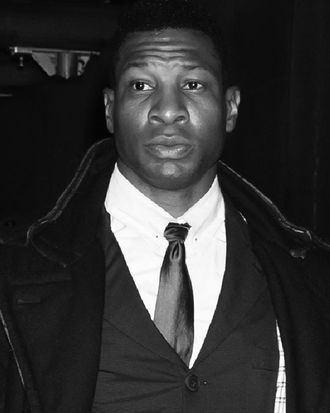
A jury returned a mixed verdict against Jonathan Majors in his domestic-violence trial, finding the actor guilty of misdemeanor assault and harassment but acquitting him of two other charges. Jurors found Majors not guilty of the most serious charge, assault in the third degree with intent to cause physical injury, as well as aggravated harassment. The verdict came after roughly six hours of deliberation following a trial marked by emotional testimony, a bullish defense, and dramatic closing arguments. Majors looked at the jury somberly as the verdict was read.
The charges stemmed from an alleged domestic-violence incident on March 25. According to both the defense and prosecution, the incident began with Majors’s ex-girlfriend, choreographer Grace Jabbari, grabbing his phone after seeing a text message from another woman. In her testimony, Jabbari said Majors assaulted her while trying to wrestle back his phone in the backseat of a chauffeured car and then bolted onto the street. She said the alleged attack left her with a gash behind her ear and a fractured finger. Majors’s lawyers argued that Jabbari assaulted Majors in the car by tearing off the button on his jacket, hurt herself after the couple separated for the night, and then decided to pin the injuries on the actor in a fit of jealousy.
For more than two weeks of court proceedings, Majors has shown up in pristine dark suits alongside his current girlfriend, the actor Meagan Good, and a group of friends and family, including his mother. He frequently read the Bible, wrote in his notebook, and drank from a brown ceramic mug during the proceedings. Lawyers on either side relied on surveillance and police body-camera footage to make their respective cases. The prosecution played video of Majors pushing Jabbari inside an Escalade multiple times and showed images of her injuries that she sent to a friend. The defense dwelled on footage from a nightclub, where they pointed to Jabbari using her supposedly fractured finger to take shots, pay her credit-card bill, and smoke a cigarette after the incident. The driver of the Escalade, the only witness to the alleged altercation, said that though he “had a feeling the girl had hit the boy,” the only physical violence he saw with his own eyes was Majors pushing Jabbari back into the car “to get rid of her.”
Jabbari also delivered emotional testimony over the course of four days, at times bursting into tears and asking to leave the courtroom for a short break in response to the defense’s dogged cross-examination. She recounted numerous incidents over the course of their relationship in which she said Majors lost his temper, at times smashing candles against the wall or stomping on her headphones. Jabbari also read aloud text messages related to a previous incident in which Majors warned her against going to the hospital since it could “lead to an investigation.” (“I will tell the doctor I bumped my head if I go,” Jabbari responded.) The prosecution also played audio of Majors admonishing Jabbari for being drunk, calling himself a “great man” who needs the support of a partner like Coretta Scott King or Michelle Obama. The actor mostly avoided eye contact with his ex during her testimony, but glared at her with a furrowed brow as she described him hitting her head and twisting her arm during the March 25 incident.
In her closing arguments, Majors’s lawyer, Priya Chaudhry, called Jabbari “a liar” who drinks too much and described Majors as a victim of racist policing. “You don’t get to destroy people’s lives with your fantasies,” Chaudhry said. “Grace is obviously an emotional person — many people are — but she cannot distinguish between facts and her feelings.” Prosecutor Kelli Galaway took a more cut-and-dried approach, walking jurors through the evidence to argue there was no other way Jabbari could have sustained her injuries and that she had no impetus to lie about the alleged assault.
In a statement after the verdict, the Manhattan district attorney’s office praised Jabbari for telling her story on the stand. “The evidence presented throughout this trial illustrated a cycle of psychological and emotional abuse, and escalating patterns of coercion far too common across the many intimate partner violence cases we see each and every day,” the statement read. “Today, a jury determined that pattern of abuse and coercion culminated with Mr. Majors assaulting and harassing his girlfriend.”
Chaudhry had a different interpretation of the verdict, emphasizing that the jury acquitted Majors of assault with intent. “It is clear that the jury did not believe Grace Jabbari’s story of what happened in the SUV because they found that Mr. Majors did not intentionally cause any injuries to her,” she said in a statement. “We are disappointed, however, that despite not believing Ms. Jabbari, the jury nevertheless found that Mr. Majors was somehow reckless while she was attacking him.” She added that, “Mr. Majors still has faith in the process and looks forward to fully clearing his name.”
The trial has pushed Majors away from the precipice of A-list fame. He met Jabbari on the set of Ant-Man and the Wasp: Quantumania, where she worked as a movement director and he starred as Kang the Conqueror. While the defense painted Jabbari as fame hungry, the choreographer has worked on multiple high-profile projects herself, including Barbie and the most recent film in the Mission: Impossible franchise. Majors’s Kang character was set to be a fixture in the Marvel franchise going forward, and the actor had already generated Oscar buzz for his performance as a bodybuilder with violent fantasies in Magazine Dreams; that film’s release has been indefinitely postponed. After the verdict was announced, Majors was dropped by Marvel, according to Variety.
Majors now faces up to a year behind bars and is scheduled to be sentenced on February 6.
This post has been updated.





